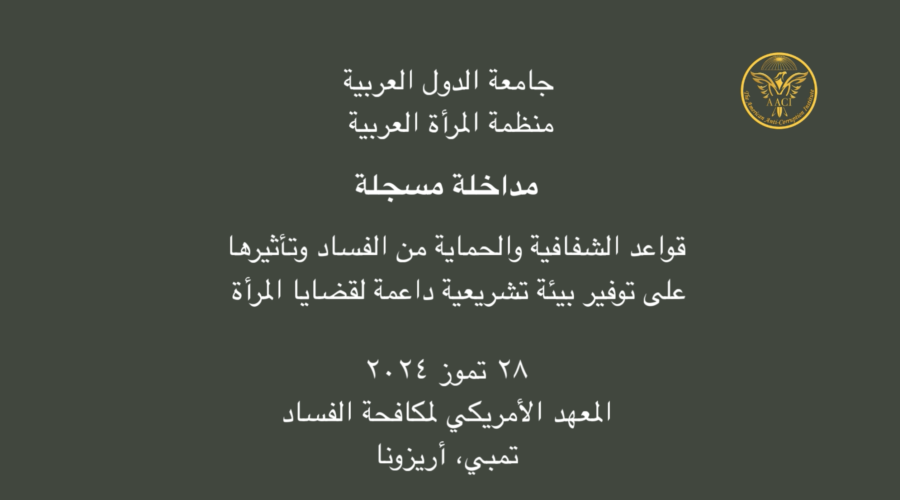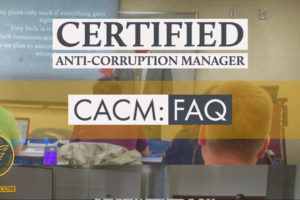Technical Staff;
August 14, 2024
On July 31, 2024, The American Anti-Corruption Institute (AACI) participated in the regional meeting of the Arab Women Organization focused on “Gender Justice in Legislation and Public Policies,” held from July 29 to 31, 2024. Our participation was in Arabic. However, we translated our recommendations into English below.

“Greetings, I am Mike Masoud, the Director of The American Anti-Corruption Institute (AACI) for the Middle East and Africa. It is my privilege to participate in the regional meeting of the Arab Women Organization focused on “Gender Justice in Legislation and Public Policies,” held from July 29 to 31, 2024.
I would like to extend my gratitude to the Arab Women Organization and its Director General, Dr. Fadia Kiwan, for inviting me to discuss the topic of “Transparency and Anti-Corruption Measures and Their Impact on Creating a Legislative Environment Supportive of Women’s Issues.”
In my presentation, I will explore this topic by first defining corruption and transparency, and then outlining the Ten Principles of Fighting Corruption developed by The AACI. My discussion will be supported by relevant data, studies, and research, leading to an analysis that will culminate in a set of recommendations.
The discussion will be framed around the premise that effective anti-corruption strategies and transparency are fundamental in establishing a legislative environment that not only protects but also advances women’s issues. By ensuring that power is exercised with accountability and that information is accessible and reliable, we can foster a legislative framework that genuinely supports gender justice.
Click here to read the Arabic text of our participation.
Conclusion and Recommendations
The implementation of the Ten Principles of Fighting Corruption and related Standards on Fighting Corruption (SFCs) contributes to improving women’s opportunities and quality of life. Gender inequality creates a fertile environment for corruption through networks of influence, whereas countries achieve lower levels of corruption when they reach a higher level of gender equality.
There is a strong connection between gender equality and effective anti-corruption efforts.
The design, implementation, and evaluation of a national anti-corruption strategy can only be effective with the participation of women, as they are most adept at addressing their own issues. This also applies to the legislative environment and the drafting of laws. Women’s presence in parliament, or its equivalent, plays a crucial role in enriching the quality and effectiveness of legislation, especially by incorporating their perspectives on women’s needs and issues.
Recommendations
First: The state and its relevant entities should collect reliable, gender-disaggregated data and provide this information to policymakers, especially data that highlights the different impacts of corruption on men and women. This is crucial for designing effective strategies and policies to combat corruption and reduce its risks on all segments of society, particularly the largest and most marginalized group—women.
Second: Efforts should be made to raise awareness in society and among policymakers about the nature of corruption and its different impacts on men and women.
Third: Women’s capacities in combating corruption should be strengthened following the Ten Principles of Fighting Corruption. This is essential for women to play a distinguished role in asserting themselves in decision-making positions. Combating corruption requires a specific culture and knowledge related to governance, internal control, whistleblowing, and other important relevant topics.
Fourth: Enhance women’s abilities to prepare successive generations of female leaders through a strategic, comprehensive, and sustainable approach.
Fifth: Strengthen the role of women in building national and institutional integrity systems, including legislative institutions and parliamentary work.
Sixth: Systematically increase transparency to ensure access to all information that fosters an environment for active and engaged citizens in the governance of their country, as they are the source of authority.
Seventh: Rely more and more on the standard of competence and benefit from women’s advancement in various professional and scientific fields, enabling them to raise performance levels in legislation and its outcomes, providing protection and prevention from corruption for women, families, and society as a whole.
Finally, women constitute half of society in most communities, which necessitates their equal participation in the development of laws and legislation that will be applied to this half of society as well. Their involvement in governance facilitates the implementation of laws and institutionalizes corruption prevention.
In conclusion, thank you for your attention, and I am pleased to answer any of your questions.











































